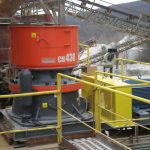The choice of a machine for a given crushing operation is influenced by the nature of the product required and the quantity and size of material to be handled. The more important properties of the feed apart from its size are as follows: Hardness. The hardness of the material affects the power consumption and the wear on the machine. With hard and abrasive materials it is necessary to use a low-speed machine and to protect the bearings from the abrasive dusts that are produced. Pressure lubrication is recommended. Materials are arranged in order of increasing hardness in the Mohr scale in which the first four items rank as soft and the remainder as hard. The Mohr Scale of Hardness is:
1. Talc
2. Rock salt or gypsum
3. Calcite
4. Fluorspar
5. Apatite
6. Felspar
7. Quartz
8. Topaz
9. Carborundum
10.Diamond
Structure. Normal granular materials such as coal, ores and rocks can be effectively crushed employing the normal forces of compression, impact, and so on. With fibrous
materials a tearing action is required.
Moisture content. It is found that materials do not flow well if they contain between about 5 and 50 per cent of moisture. Under these conditions the material tends to cake together in the form of balls. In general, grinding can be carried out satisfactorily out side these limits.
Crushing strength. The power required for crushing is almost directly proportional to the crushing strength of the material.
Friability. The friability of the material is its tendency to fracture during normal handling. In general, a crystalline material will break along well-defined planes and the power required for crushing will increase as the particle size is reduced.
Stickiness. A sticky material will tend to clog the grinding equipment and it should therefore be ground in a plant that can be cleaned easily.
Soapiness. In general, this is a measure of the coefficient of friction of the surface of the material. If the coefficient of friction is low, the crushing may be more difficult.
Explosive materials must be ground wet or in the presence of an inert atmosphere. Materials yielding dusts that are harmful to the health must be ground under conditions
where the dust is not allowed to escape. WORK(19) has presented a guide to equipment selection based on size and abrasiveness of material.


